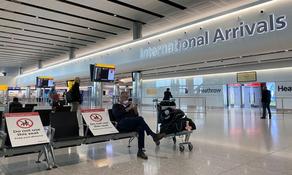
The European Union Aviation Safety Agency (EASA) published 28-pages of guidelines that will radically alter the experience of flying, including physical distancing measures that Heathrow’s chief executive has previously said would be impossible to implement. The UK has had no role in shaping EASA policy since the official Brexit date of 31 January but remains a member until the end of the year.
Airlines and airports are likely to adopt many of the guidelines, which cover every stage of the air travel process.
Anyone who develops symptoms after booking, or has been in contact with someone suffering from Covid-19, should not turn up to the flight.
Passengers should not expect a lingering goodbye with loved ones at the terminal. With few exceptions, nobody who is not travelling or working there will be allowed inside.
Those travelling are expected to take precautions such as washing hands and wearing masks, with exceptions for children under six and people with a medical reason not to. Regular reminders will be broadcast through the public address system, alongside the usual security messages and flight information.
EASA also recommends “respiratory etiquette”, such as covering the face when sneezing. Those who do not comply could be ejected from the airport and suffer further penalties from local authorities.
Physical distancing is defined as 1.5m, rather than the 2 metre gap Britons have been told to maintain. As in many shops and offices, there will be floor markings to show people where to stand in queues.
Hand luggage restrictions could be even stricter. EASA recommends cutting down on cabin bags to speed up boarding and reduce contamination risk. It recommends airlines incentivise customers to do this, so there may be discounts on hold luggage charges.
Passengers should be spaced apart if possible while boarding and disembarking and where buses are used, more should be provided. There may be an automated disinfectant dispenser at the aircraft door and a mat soaked with disinfectant to walk on.
The aircraft should be thoroughly disinfected between flights, so trays are likely to be less grubby at least. EASA has asked airlines to install better air filters to clean the air in the cabin but everyone, passengers and crew, will be expected to wear masks. EASA recommends discarding them after four hours, meaning several may be needed for long-haul flights.
EASA recommends strict protocols if someone falls ill on board with Covid-19 symptoms. Two rows of seats in every direction should be cleared and anyone who was sitting in them could be interviewed by public health authorities when they land. Their travelling companions will also be isolated.
Source The Guardian
































